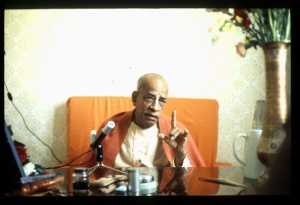SB 7.2.49: Difference between revisions
No edit summary |
(Vanibot #0054 edit - transform synonyms into clickable links, which search similar occurrences) |
||
| Line 23: | Line 23: | ||
<div class="synonyms"> | <div class="synonyms"> | ||
''atha'' | ''[//vanipedia.org/wiki/Special:VaniSearch?s=atha&tab=syno_o&ds=1 atha]'' — therefore; ''[//vanipedia.org/wiki/Special:VaniSearch?s=nityam&tab=syno_o&ds=1 nityam]'' — the eternal spirit soul; ''[//vanipedia.org/wiki/Special:VaniSearch?s=anityam&tab=syno_o&ds=1 anityam]'' — the temporary material body; ''[//vanipedia.org/wiki/Special:VaniSearch?s=vā&tab=syno_o&ds=1 vā]'' — or; ''[//vanipedia.org/wiki/Special:VaniSearch?s=na&tab=syno_o&ds=1 na]'' — not; ''[//vanipedia.org/wiki/Special:VaniSearch?s=iha&tab=syno_o&ds=1 iha]'' — in this world; ''[//vanipedia.org/wiki/Special:VaniSearch?s=śocanti&tab=syno_o&ds=1 śocanti]'' — they lament for; ''[//vanipedia.org/wiki/Special:VaniSearch?s=tat&tab=syno_o&ds=1 tat]-[//vanipedia.org/wiki/Special:VaniSearch?s=vidaḥ&tab=syno_o&ds=1 vidaḥ]'' — those who are advanced in knowledge of the body and soul; ''[//vanipedia.org/wiki/Special:VaniSearch?s=na&tab=syno_o&ds=1 na]'' — not; ''[//vanipedia.org/wiki/Special:VaniSearch?s=anyathā&tab=syno_o&ds=1 anyathā]'' — otherwise; ''[//vanipedia.org/wiki/Special:VaniSearch?s=śakyate&tab=syno_o&ds=1 śakyate]'' — is able; ''[//vanipedia.org/wiki/Special:VaniSearch?s=kartum&tab=syno_o&ds=1 kartum]'' — to do; ''[//vanipedia.org/wiki/Special:VaniSearch?s=sva&tab=syno_o&ds=1 sva]-[//vanipedia.org/wiki/Special:VaniSearch?s=bhāvaḥ&tab=syno_o&ds=1 bhāvaḥ]'' — the nature; ''[//vanipedia.org/wiki/Special:VaniSearch?s=śocatām&tab=syno_o&ds=1 śocatām]'' — of those prone to lamentation; ''[//vanipedia.org/wiki/Special:VaniSearch?s=iti&tab=syno_o&ds=1 iti]'' — thus. | ||
</div> | </div> | ||
Latest revision as of 22:59, 18 February 2024

A.C. Bhaktivedanta Swami Prabhupada
TEXT 49
- atha nityam anityaṁ vā
- neha śocanti tad-vidaḥ
- nānyathā śakyate kartuṁ
- sva-bhāvaḥ śocatām iti
SYNONYMS
atha — therefore; nityam — the eternal spirit soul; anityam — the temporary material body; vā — or; na — not; iha — in this world; śocanti — they lament for; tat-vidaḥ — those who are advanced in knowledge of the body and soul; na — not; anyathā — otherwise; śakyate — is able; kartum — to do; sva-bhāvaḥ — the nature; śocatām — of those prone to lamentation; iti — thus.
TRANSLATION
Those who have full knowledge of self-realization, who know very well that the spirit soul is eternal whereas the body is perishable, are not overwhelmed by lamentation. But persons who lack knowledge of self-realization certainly lament. Therefore it is difficult to educate a person in illusion.
PURPORT
According to the mīmāṁsā philosophers, everything is eternal, nitya, and according to the Sāṅkhya philosophers everything is mithyā, or anitya—impermanent. Nonetheless, without real knowledge of ātma—, the soul, such philosophers must be bewildered and must continue to lament as śūdras. Śrīla Śukadeva Gosvāmī therefore said to Parīkṣit Mahārāja:
- śrotavyādīni rājendra
- nṛṇāṁ santi sahasraśaḥ
- apaśyatām ātma-tattvaṁ
- gṛheṣu gṛha-medhinām
"Those who are materially engrossed, being blind to knowledge of the ultimate truth, have many subjects for hearing in human society, O Emperor." (SB 2.1.2) For ordinary persons engaged in material activities there are many, many subject matters to understand because such persons do not understand self-realization. One must therefore be educated in self-realization so that under any circumstances in life he will remain steady in his vows.